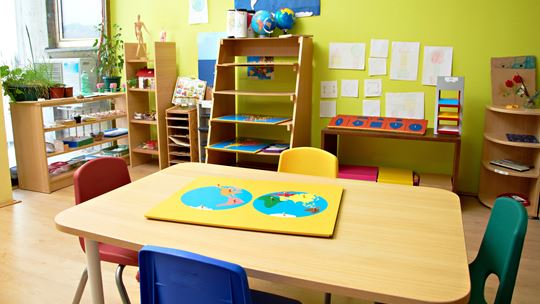
Through our ISP Teynham School, we have the unique benefit of employing an experienced Speech and Language therapy team headed by a qualified Speech and Language Therapist and two very experienced Speech and Language Therapy Assistants. Our S & L team work in close collaboration with education staff across both sites offering our pupils additional support for their individual communication needs.
Through our therapeutic and holistic approach to education, we are able to embed effective practices in our everyday classroom delivery. We are attachment and trauma-informed, so are able to work sensitively to enable young people to feel safe, included within the school community and to attend regularly.
How is the school structured?
We have two bespoke groupings of 6 pupils plus a class teacher/tutor and at least one Progress Engagement Guide (PEG) per group. We also have additional support available in for individualised work on a 1:1 basis. Pupils are placed in the group that ‘best fits’ their developmental stage and academic need.
Our small class group size, balanced with a high level of experienced support, creates a safe and nurturing environment for pupils to begin to close the gaps in their skills, knowledge and understanding. Our highly experienced PEGs offer support, guidance and assistance across the school day, including in class and break times. They also encourage independent learning and empower pupils to achieve their potential.
What is the school’s ethos?
We offer a safe and nurturing environment which enables pupils to achieve their potential. Our empathetic staff work closely with pupils to build trusting relationships which form the basis of everything we do. We acknowledge the uniqueness of each person and we identify individual strengths and needs, then differentiate the curriculum accordingly
We help our pupils develop their emotional resilience to cope with successes and disappointments. We also encourage them to become independent learners.
Our curriculum beliefs
Pupils learn both through child-initiated play and carefully planned adult-led activities.
In a safe and stimulating environment, pupils are encouraged to apply all the skills they have learnt in exciting and interesting ways. This promotes a firm foundation and allows pupils to demonstrate skills through action.
We recognise that metacognitive strategies are important in deepening the learning process.
Our key strategies include: Building resilience, practical application, managing cognitive load, supporting working memory, elaborated word teaching and celebrating success. To this end, we ensure that our pupils are taught the National Curriculum at a pace that suits their needs. We believe that learning has occurred when a child has experienced a change in their long-term memory. As a community we value our amazing surroundings and support opportunities where pupils can experience the best that Kent and Medway have to offer so that they can celebrate the world around them.
We recognise that the county in which the school sits has higher than average rates of health and wellbeing concerns.
Pupils are encouraged to become active through a range of experiences.
We embrace a rich, diverse British culture and actively seek out opportunities for our pupils to experience multi-culturalism.
Beyond Britain, we ensure our pupils develop an understanding of, and curiosity about, the wider world, preparing them for their role as a global citizen.
Our pupils deserve to be captivated in the exploration and possibilities of learning.
Through amazing openings, exciting endings, opportunities to access real-life learning and lessons designed with individualism in mind our pupils learn with passion and enthusiasm.

Supporting your child
How will the school prepare and support my child to join the school?
We know that each child has individual qualities and skills gaps that may not have been recognised, our aim is to develop pupils’ skills and help them achieve positive outcomes. Before offering a place at the school we will hold an initial network meeting, this meeting is an opportunity to discuss strengths and skills gaps. We will also agree on an appropriate transition into the school. This transition will consider your preferences, how long a young person has been out of education, their SEN and any emotional barriers to learning that has contributed negatively to their educational attainment and experience to date.
All transitions into school are based on a therapeutic, child-led induction based on relationship building. Pupils are given an individual timetable which is reviewed weekly until they are fully engaged in school. The process of transitioning a new pupil into school usually takes a few weeks but can take longer depending on the needs and experiences of the young person. Additionally, we aim to match our pupils with peers with the same or similar interests and encourage peer mentoring where appropriate.
How will my child be supported?
A comprehensive assessment process is central to our work to ensure that appropriate targets and interventions are in place. We baseline academic, communication and emotional skills.
We will identify needs, set targets that will challenge and extend their knowledge and teach the necessary skills. We will also identify and implement appropriate strategies to help them achieve these targets.
Our highly experienced Pupil Engagement Guides (PEGs) offer support, guidance and assistance across the school day including in class and break times. They also encourage independent learning and empower young people.
How can I be involved in my young person’s education?
We aim to foster positive relationships with our parents and foster parents. We recognise that this relationship and collaborative working is crucial for achieving the best outcomes for our pupils. Along with Statutory meetings for looked after children, such as Personal Education Planning, Child in Care Reviews and EHCP reviews, we also invite parents and carers in for informal meetings where honest and open dialogue ensures that the young person feels supported and encouraged by all the professionals and adults working around them.
We welcome parents and carers as active participants in their child’s education and meet half termly to share positives, concerns and discuss future plans. We provide regular feedback to parents and carers including end of term reports. We will let you know how your young person is progressing through positive phone calls home and if we do have any concerns, we will share these with you. You are very welcome to contact us at any time if you have any concerns, anything you feel we should know or positives to share.
We ask that you contact the school if you feel there is anything we need to know.
How will you keep my child safe?
ISP Whitstable has a high staff to pupil ratio which is reviewed regularly depending on the needs of the children. We have a dedicated SEN team and an experienced DHT as our Designated Safeguarding Lead.
All our staff are fully DBS checked and are trained in Safeguarding policy and procedure.
We listen to the young people who attend our school and recognise that safeguarding is everyone’s responsibility.
How will you manage my young person’s challenging behaviour?
We aim to develop positive relationships with pupils to help them express their feelings and manage their emotions in appropriate ways. We will work hard to understand what skills gaps your young person has and teach them skills to behave well. We use Class Dojo, an online behaviour management system intended to foster positive pupil behaviours and classroom culture.
Teachers build a positive classroom culture by encouraging pupils and communicating with parents. Parents and foster parents can see issues and positive behaviour and achievement points on a daily basis and use these to link with the school. All staff are trained in Protecting Rights in a Caring Environment (PRICE) which gives us an insight into why difficult behaviour occurs and how to approach them.
How will I know that the school continues to be the most appropriate provision for my young person?
The Annual EHCP review will ensure that your young person continues to attend the most appropriate provision. Should your child’s needs change between reviews, the school, parent/ foster parent may request an early review to discuss whether the school remains the most appropriate provision. This may then inform a managed transfer to an alternative specialist provision or in some cases a return to mainstream education.
Our Vision
Our school values are embedded into our learning: We strives to help all pupils reach their potential and believe that they can achieve, be kind, make positive relationships, communicate well and grow as individuals.
Our Mission
Our mission is to provide each pupil with a diverse and appropriate education in a safe, supportive environment that promotes self-discipline and engagement, inspires learning and encourages aspiration and achievement.
Our Values
At our school relationships are the cornerstone of everything we do and this is reflected in our values:
- Relationships: We learn to develop effective relationships, by building trust and respect, and developing self-esteem and self-confidence.
- Education: We are learning to learn in all that we do.
- Lifelong: We make relationships which will support and inspire us to be our best. We recognise the importance of well-being and positive self-image
- Aspirations: We are looking to the future and working on positive and life affirming targets towards where we want to be.
- Teamwork: We work together to achieve excellence.
- Equality: We embrace the opportunities we are presented with and show respect to all.
Headteacher
Carole Cox
ISP School Whitstable, Regent Street, Whitstable CT5 1JD
01227 771172
01795 523900
Deputy Head: Stephen Rumball
Director of Education
Toni Reedman
ISP School Whitstable, Regent Street, Whitstable CT5 1JD
01227 771172
Chair of Governors
Jacqui Ward
ISP School Whitstable, Regent Street, Whitstable CT5 1JD
01227 771172
Proprietor
INTEGRATED SERVICES PROGRAMME.
Malvern View Saxon Business Park, Hanbury Road, Stoke Prior, Bromsgrove, B60 4AD
01527 556480

Tackling the sexual abuse and exploitation of children and young people
CEOP is a command of the National Crime Agency and is dedicated to tackling the sexual abuse and exploitation of children and young people. CEOP helps children and young people under the age of 18 who have been forced or manipulated into taking part, or are being pressured to take part, in sexual activity of any kind. This can be both online and offline. The CEOP Safety Centre offers information and advice for children and young people, parents and carers and professionals. You can visit the CEOP Safety Centre and make a report directly to CEOP by clicking the Click CEOP button.
Online bullying or other online concerns should not be reported to CEOP and children and young people should be directed to speak to an adult they trust, and/or referred to Childline, if they would like to speak to someone about how they are feeling.

